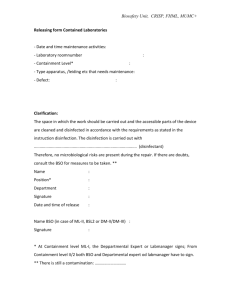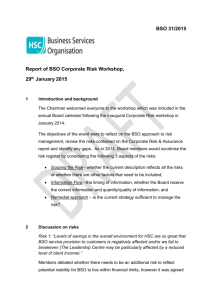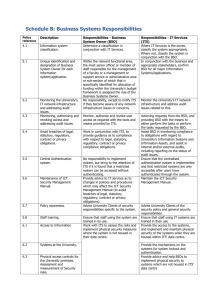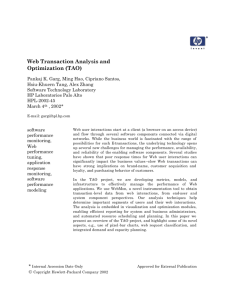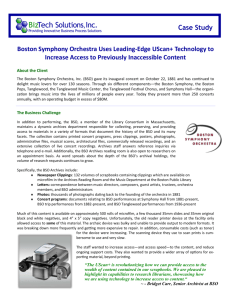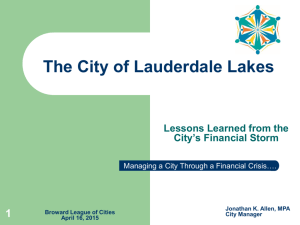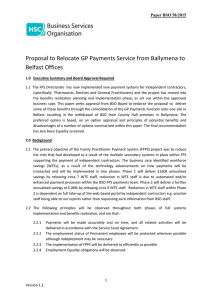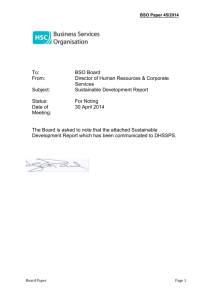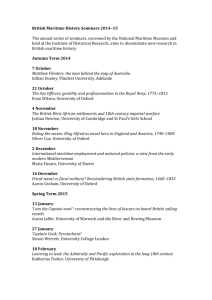SP 234 – International Relations
advertisement
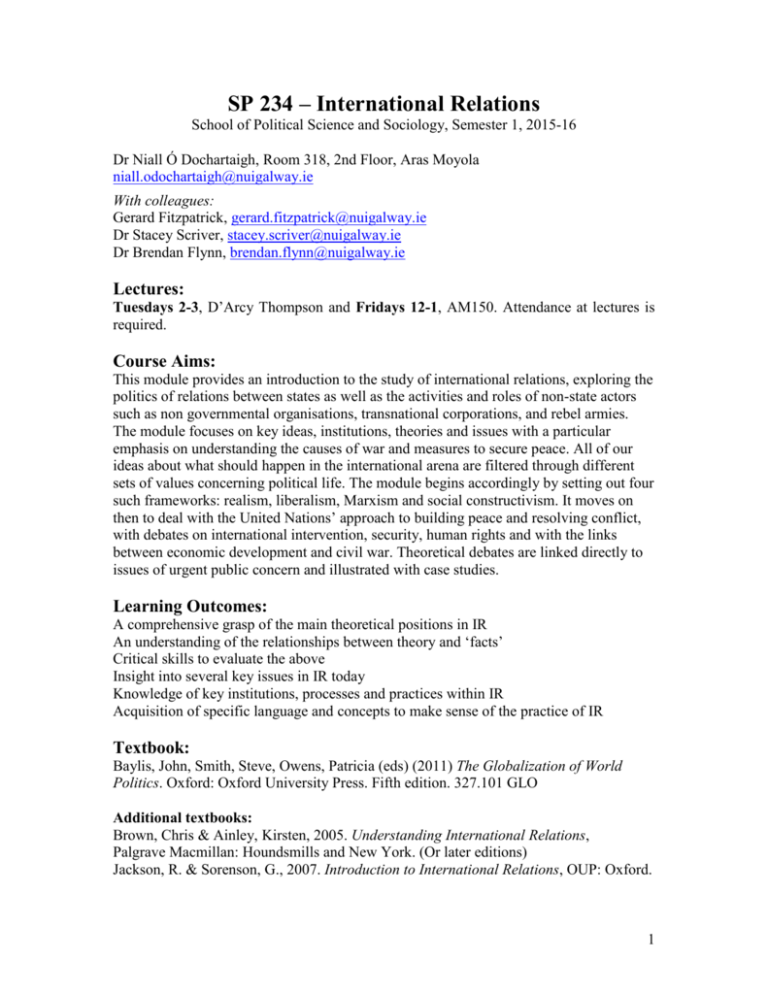
SP 234 – International Relations School of Political Science and Sociology, Semester 1, 2015-16 Dr Niall Ó Dochartaigh, Room 318, 2nd Floor, Aras Moyola niall.odochartaigh@nuigalway.ie With colleagues: Gerard Fitzpatrick, gerard.fitzpatrick@nuigalway.ie Dr Stacey Scriver, stacey.scriver@nuigalway.ie Dr Brendan Flynn, brendan.flynn@nuigalway.ie Lectures: Tuesdays 2-3, D’Arcy Thompson and Fridays 12-1, AM150. Attendance at lectures is required. Course Aims: This module provides an introduction to the study of international relations, exploring the politics of relations between states as well as the activities and roles of non-state actors such as non governmental organisations, transnational corporations, and rebel armies. The module focuses on key ideas, institutions, theories and issues with a particular emphasis on understanding the causes of war and measures to secure peace. All of our ideas about what should happen in the international arena are filtered through different sets of values concerning political life. The module begins accordingly by setting out four such frameworks: realism, liberalism, Marxism and social constructivism. It moves on then to deal with the United Nations’ approach to building peace and resolving conflict, with debates on international intervention, security, human rights and with the links between economic development and civil war. Theoretical debates are linked directly to issues of urgent public concern and illustrated with case studies. Learning Outcomes: A comprehensive grasp of the main theoretical positions in IR An understanding of the relationships between theory and ‘facts’ Critical skills to evaluate the above Insight into several key issues in IR today Knowledge of key institutions, processes and practices within IR Acquisition of specific language and concepts to make sense of the practice of IR Textbook: Baylis, John, Smith, Steve, Owens, Patricia (eds) (2011) The Globalization of World Politics. Oxford: Oxford University Press. Fifth edition. 327.101 GLO Additional textbooks: Brown, Chris & Ainley, Kirsten, 2005. Understanding International Relations, Palgrave Macmillan: Houndsmills and New York. (Or later editions) Jackson, R. & Sorenson, G., 2007. Introduction to International Relations, OUP: Oxford. 1 Reus, Smit, Christian (ed.), The Oxford Handbook of International Relations, OUP, Oxford. Course Programme 1. Introduction and International History Dr Niall Ó Dochartaigh Essential Reading: Baylis, Smith & Owens (eds) (2011) The Globalization of World Politics [hereafter BSO] ‘Introduction’ and Ch. 3 ‘International History 1900-1945’. Additional Reading: Armstrong, D (2011) Ch.2 ‘The evolution of international society’ in BSO. Brown, C. & Ainley, K. (2005) Ch. 1 ‘Introduction: Defining International Relations’. Cox, M. (2011) Ch.4 ‘From the Cold War to the World Economic Crisis’ in BSO. McGrew, A. (2011) Ch.1 ‘Globalization and Global Politics’ in BSO. Young, J. & Kent, J, (2003) International Relations since 1945: A global history. Oxford: OUP. 2: Introduction to IR Theory and Liberalism Gerard Fitzpatrick Essential Reading: Lamy, S, 2011. “Contemporary Mainstream Approaches” in BSO, 114-129. Dunne, T., 2011, “Liberalism” in BSO: 100-113 Additional Reading: Brown C and Ainley K, 2005, “The Development of International Relations Theory in the Twentieth Century”, Chapter Two: 19-39. 3: Theory: Realism Gerard Fitzpatrick Essential Reading: Dunne, T. & Schmidt B., 2011, “Realism” in BSO: 84-99. Additional Reading: Brown and Ainsley, ibid, Chapter 2, 19-39. 4: Theory: Marxism and IPE/Globalism Gerard Fitzpatrick Essential Reading: Hobden, S. and Wyn Jones, R., 2011, “Marxist Theories of International Relations” in BSO: 130-147. ‘Introduction: and Globalization and global politics’, BSO, 1-29. 2 5: Theory: Social Constructivism and the IR of the EU Gerard Fitzpatrick Essential Reading: Barnett, M., 2005, “Social Constructivism” in BSO: 148-165. Additional Reading: Brown, C. & Ainley, K., 2005, “International Relations Theory Today”, Chapter Three. 6. Interrogating Security: a Gender Perspective Dr Stacey Scriver Essential Reading: Tickner, J. Ann (2011) Ch.16 ‘Gender in World Politics” in BSO. Additional Reading: Tickner, J, Ann, 1992. Gender in International Relations, New York, Columbia University Press, Esp chs 1,2 & 5. Whitworth, Sandra, 2004. Men Militarism and UN Peacekeeping: A Gendered Analysis, Lynne Rienner: Boulder. Preface and Chs 1/2/6 and 7. Parpart, J & Zalewski M (eds). 2008. Rethinking the Man Question: Sex. Gender and Violence in International Relations, Palgrave Macmillan. 7. The European Union as a (Maritime) Security Actor Dr Brendan Flynn Essential Reading: Germond, Basil. The Maritime Dimension of European Security: Seapower and the European Union. Palgrave Macmillan, 2015. (Chs. 7, 8 and Conclusion most relevant) OR Howorth, Jolyon. Security and defence policy in the European Union. Palgrave Macmillan, 2014. 2nd edition.(Chs. 1 and 5 relevant)TBC Additional Reading: (On Blackboard in the case of articles, Books are in the library on 24hr loan) Bueger, Christian. "What is maritime security?." Marine Policy 53 (2015): 159-164. Bellamy, Chris. "Maritime piracy: return of the world's second-oldest security problem." The RUSI Journal 156, no. 6 (2011): 78-83. Bueger, Christian. "Drops in the bucket? A review of onshore responses to Somali piracy." WMU Journal of Maritime Affairs 11, no. 1 (2012): 15-31. Germond, Basil. "The geopolitical dimension of maritime security." Marine Policy 54 (2015): 137-142. 3 Kaunert, Christian, and Kamil Zwolski. "Somalia versus Captain ‘Hook’: assessing the EU's security actorness in countering piracy off the Horn of Africa." Cambridge Review of International Affairs 27, no. 3 (2014): 593-612. Gebhard, Carmen, and Simon J. Smith. (2015) "The two faces of EU–NATO cooperation: Counter-piracy operations off the Somali coast." Cooperation and Conflict, 50, no. 1, pp.107-127. Kamp, Karl-Heinz (2015) "Europe's defence project–time for transatlantic rearrangement." Global Affairs, 1, no. 2, pp.183-191. Riddervold, Marianne. (2014) "New threats–different response: EU and NATO and Somali piracy." European Security, 23, no. 4, pp.546-564. Riddervold, Marianne. "(Not) in the Hands of the Member States: How the European Commission Influences EU Security and Defence Policies." JCMS: Journal of Common Market Studies (2015). Brady, Hugo. "Mare Europaeum? Tackling Mediterranean migration." European Union Institute for Security Studies Brief 25 (2014). Fargues, Philippe, and Sara Bonfanti. "When the best option is a leaky boat: why migrants risk their lives crossing the Mediterranean and what Europe is doing about it." (2014) EU RCS Policy Brief 2014/05. You might also take a look at the actual EU Maritime Security Strategy document and related details, especially if this topic interests you or you plan on answering it for the exam. See: http://ec.europa.eu/maritimeaffairs/policy/maritime-security/index_en.htm 8. The United Nations and Global Security Dr Niall Ó Dochartaigh Essential Reading: Taylor, P & Curtis, D. (2011) ch.19 ‘The United Nations’ in BSO Baylis, J. (2011) Ch.14 ‘International and Global Security’ in BSO Additional Reading: Acharya, A. (2011) Ch.29 ‘Human Security’ in BSO Reus-Smit, C. (2011) Ch.17 ‘International Law’ in BSO. Weiss, Thomas G. (2009) What’s Wrong With The UN and How to Fix It. Cambridge: Polity. 9: Humanitarian Intervention Dr Niall Ó Dochartaigh Essential Reading: Bellamy A. & Wheeler, N. (2011) Ch.31 “Humanitarian intervention in world politics” in BSO. Additional Reading: 4 Berdal, M. & Economides, S. (2007) United Nations Interventionism 1991-2004. Cambridge: Cambridge UP. Chandler, D. (2009) “Unravelling the Paradox of the ‘Responsibility to Protect’. Irish Studies in International Affairs, Vol. 20: 27-39. Donnelly, J. (2011) Ch. 30, ‘Human Rights’ in BSO. Wheeler, N., 2000. “Global bystanders to Genocide – International Society and the Rwandan Genocide of 1994” in Wheeler, N, Saving Strangers: humanitarian intervention in international society, OUP: Oxford.: 208-241. [On Blackboard] Hehir, Aidan 2010. Humanitarian Intervention: an Introduction, Palgrave Macmillan. Hehir, Aidan (2010) ‘The Responsibility to Protect: Sound and fury, signifying nothing?’ International Relations 24 (2): 218-239. 10: War and Development Dr Niall Ó Dochartaigh Essential Reading: Sheehan, M. (2011) Ch.13 ‘The changing character of war’ in BSO. Thomas, C. and Evans, T. (2011) Ch.28 ‘Poverty, Development and Hunger’ in BSO. Additional Reading: Andersen, R., 2000. “How multilateral development assistance triggered the conflict in Rwanda”. Third World Quarterly (21) 3: 441-456. Kalyvas, S. (2007). Civil Wars. in Boix, C. & Stokes, S.C (Eds.), The Oxford Handbook of Comparative Politics pp. 416-434. Oxford: Oxford University Press. [On Blackboard] 11 – Course Review and Revision Dr Niall Ó Dochartaigh 5
